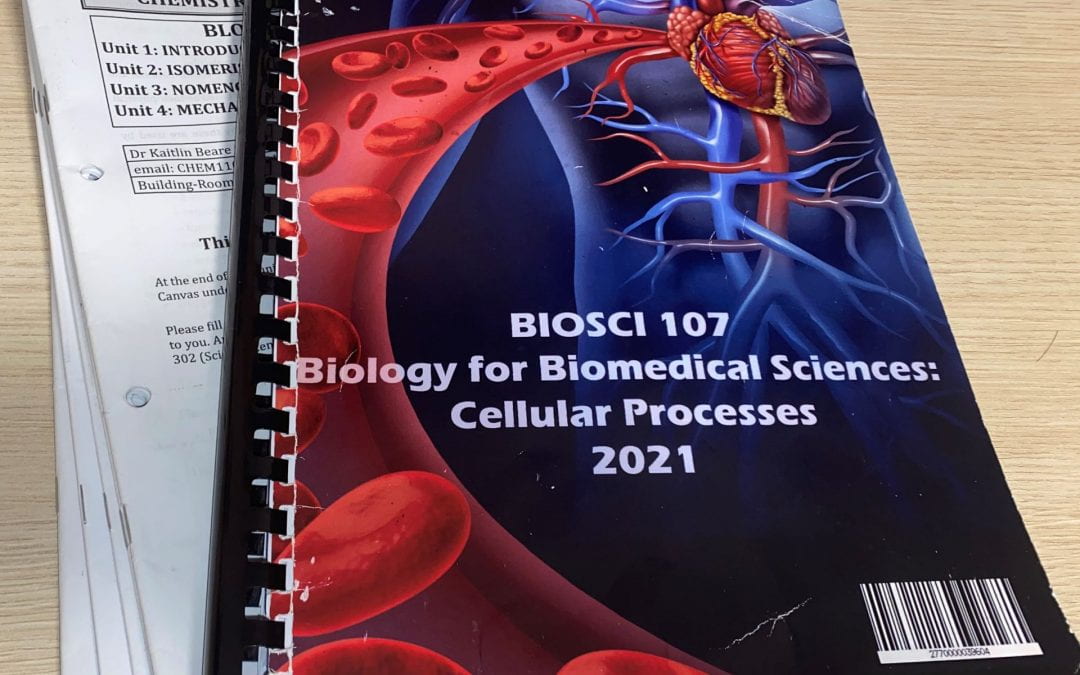Hello there! I hope you didn’t mind me losing track of how fast time flew by, but here I am again, at the end of semester one. I felt it would only be right to pop on here and share my semester one experience with you! This is mainly for anyone interested in taking first-year biomedical science or health science, but even if not, this might be helpful too. If I could give one piece of advice for anyone taking this course, it would be to compassionate to yourself and others, understand your goals, and, most importantly, have FUN. And hopefully, I can shed some light on how that can be so!
Lectures
My courses for semester one were BIOSCI107, CHEM110, POPLHLTH111 (as my core papers) and SCIGEN101G (as my gen-ed). By the sound of it, you could probably tell they are content-heavy papers, and you can’t just ‘wing it’ as you could probably do in high school unless you’re an absolute genius (which I am not denying). I strongly recommend attending the lectures in person rather than just relying on recorded lectures, mainly because I find myself more motivated to learn that way. Plus, you get to meet lots of new friends too! For each lecture, understand the learning objectives and revise using the objectives as your compass so you know how much time to spend on each part of the lecture when revising. During the lecture, I would only annotate notes if they are not given on the slides. If you have any questions about the lecture, you could also ask the lecturer immediately after the lecture (if it’s a quick question). If not, there will be allocated hours for office hours for you to ask away.
Labs
For BIOSCI107 and CHEM110, we have fortnightly labs. Both of them have pre-lab quizzes to complete before the labs and CHEM110 has post-lab activities which are usually done after the labs. The labs are really enjoyable and the tutors are really nice. That being said though, you do have to prepare by reading the lab manual before entering the lab so you won’t be too lost.
Workshop
We don’t have labs for POPLHLTH 111 but we have fortnightly workshops. These workshops require you to work with your teammates for the rest of the semester. During the workshops, students get to teach and discuss important concepts that will be examined during the mid-sem tests and exam at the end of the semester. I genuinely had a great time during the workshops and made really good friends too! A great tip would be to set goals and expectations with your teammates at the beginning of the semester. Don’t put all the work on yourselves but at the same time don’t push all the work to someone else too! Don’t forget, teamwork makes the dream work!
Tests and Exams
Just as you are about to get used to the routine, you’ll find yourself heading towards the mid-sem tests, which can be terrifying, especially if this is the first test you sit for in university. You would most likely have a two-week semester break before the mid-term test starts, which would be a great study break for your mid-sem tests. A great tip would be to make a study plan at least two weeks before your tests and work from there. This is also when you have to reflect on the study methods you are using (if you haven’t already). In my opinion, being flexible with your study methods and finding the best study method for you (which may require some trial and error) is much better than sticking with one study method just because it worked in high school. That way, when it’s the end of the semester and approaching exam season, you would know exactly which study methods work for you. Every paper requires different study methods too, just like how different battles need different military tactics, right? (Yes, if you can’t tell already, I’m into cheesy metaphors)
- For BIOSCI107, I find using the course guides together with the lecture slides helpful. I also make sure I rewatch the lecture recordings at least once before the test. Reading the textbook could be beneficial for some modules (the lecturers would tell you if textbook content is examinable or not – it slightly differs between modules). Lab content is also examinable in the mid-sem test so don’t forget about those!
- For CHEM110, doing past year papers is key!! You will be provided with a few past year papers and answers, so make sure to go through them as I found them helpful in familiarising myself with the format and content being tested.
- For POPLHLTH111, understanding the concepts/idea of population health rather than memorising the examples given during lectures was what worked for me. Workshops content are examinable too, so make sure you don’t neglect those. There were also multiple office hours set up for students to discuss questions or exam past year papers with the lecturers either via Zoom or in-person, which is helpful if you have any questions.
That being all said, I cannot emphasise enough how important taking breaks are! This journey is a marathon, not a sprint, and we all need breaks in between. Be kind to yourself and others (as this is a notoriously competitive course). Don’t forget to have fun and hopefully you’ll enjoy what you are learning! I hope this was helpful in one way or another. As usual, if you have any questions at all, don’t hesitate to leave any comments below. Till next time!

What tips does the author suggest for attending lectures and revising course material in university?
tel u